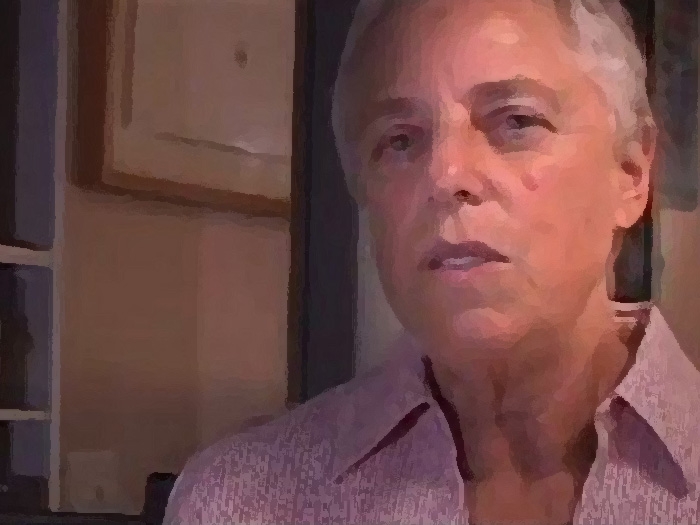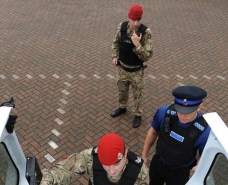Voting with our feet: women (and children) in Israel making new move(ment)s: article

Rela Mazali -
A new movement of women is emerging in Israel, in interaction with an existing but unacknowledged movement of young people. The women are challenging the risks their state is prepared to take with lives. Among them, mothers and spouses are questioning the state’s use of their sons, daughters and partners in the military. Protesting the pervasive militarization of their society, they’ve begun to work on retracting the standing loan of Jewish Israeli lives to the military. The young people are intentionally avoiding enlistment in the Israel Defense Force. This composite movement is everywhere, destabilising the public/private, emotional/rational, male/female divides.
As a young, married woman in the seventies, the only choice I had any sense of was when, not whether, I would have a baby. It never occured to me to ask myself and my partner if I, or we, wanted to undertake the children project. Today, in the late nineties, I don't think that's changed much in the secular Jewish society of Israel. Women here are either mothers or failures, to paraphrase Adrienne Rich (1976). The signs are everywhere. Measures such as public funding for advanced reproductive technology, state children's allowances, etc are progressive in terms of women's reproductive and economic rights. However, in a society so demonstrably sexist in other ways, they're also evidence of the pressure on women to mother children. Moreover, a powerful motherhood ethos assigns children privileged access to family resources; particularly to mothers' energy and time.
And yet, there is a striking discrepancy between family and community levels. While Jewish Israeli culture might be assumed to be child-oriented, a society that's pushing motherhood is not necessarily prioritizing children. Probably the opposite. To cite some telling statistics: The number of school hours per student in Israel has dropped steadily during the eighties and, after a brief rise in the mid-nineties, is dropping again. The entire Ministry of Education budget for 1998 was 0.15 per cent less than for 1997, while the student population grows annually at a rate of about 2 per cent. In the fifties, parents lived and worked in conditions approximating those at school. No airconditioning or heating, cement tile floors, no soundproofing or carpeting, uncomfortable furniture, unusable public toilets. None of the homes had airconditioning either, or wall-to-wall carpeting, or tissue toilet paper. Today, much of the adult population works and lives much more comfortably, while our children's schools remain unchanged. The number of students per classroom in primary schools - thirty-nine - hasn't budged for some twenty-five years.
I’m claiming a contradiction, in Jewish secular Israel, between attitudes to children on the personal, family level, and the collective, community level. Significantly, it seems to follow the perceived split between the sphere of emotions, the private - viewed as women's - sphere, and the public sphere of budgets, professional politics, rational thinking, business, war, held to be men's sphere. While a social construct, I believe this split reflects the present division of labour and power in our society, part of the mechanism that maintains and defines these. So women - assigned most of the overtly emotional work - are expected to follow and respond to their own and other people's feelings, expressing the so-called soft end of the emotional spectrum.
Consequently, women may provide a meaningful vehicle for men, reflecting and making tangible a range of feelings which the men play down. But this emotional license exacts the exorbitant price of not being taken seriously. Women's expressions are discredited categorically, as sentimental, hysterical, supposedly leaving men to generate the "real-world" talk - one way in which the social construct preserves an unequal distribution of power.
How is this contradiction between children's status in family and community tolerated? How do mothers in particular allow it to exist? Focusing on one possible answer, I'll describe what I view as children's role in reinforcing parents' socialization. Parents sending children to school, observing customs with them, attending public events, are guiding their daughters through a variety of institutions operated by society and defining it as such. Some of these are mundane: serving Chala - Sabbath bread - on Fridays, taking kids to parades, signing report cards. Most parents do most of these things automatically. But in so doing they're expressing membership in the community, an acceptance of its basic contracts. Participating in the social fabric, they're exercising its jurisdiction over their child.
When a son "comes home with" something a parent finds objectionable, she may not "make a fuss, because all the other kids are going," for example. It's usually mothers who deal with such trivial(-ized) dilemmas, while fathers remain unaware of them. Many mothers, reluctant to make a child feel left out, avoid challenging teachers, for fear the teacher may "get back at" her ward. So, many of us in Israel today - against our beliefs - are sending children on school trips celebrating the so-called unification of Jerusalem, or buying Hebrew text-books addressing both boys and girls in the masculine, etc. “Skipping it” is usually the habit, protesting - the difficult departure. Thus, to invert the vector usually attached to socialization, children often function inadvertently as their parents' re-socializers, involving mothers in particular in a network of social institutions, and further entrenching their compliance and silencing.
Such strategies of silence combine with the perceived split between the private and the public. Mothers' attitudes to children are widely seen as irrational, emotional, un-businesslike, acceptable only within the confines of family, not in the community.
This contradiction between family and public attitudes to children is at its most poignant at the point of joining the Israel Defence Forces (IDF). At eighteen, young Israeli boys and girls are just approaching adulthood by western standards. On the family level, enlisting is directly at odds with the parental commitment to protect children, but conscripts' parents have been re-socialized to accept their children's publicly ordained routes. Reinforced cohesion with the collective reaches its height as these children's lives are literally deposited with the state. Once they're soldiers, simply caring for them, washing or cooking for them when they're home, amounts to support for army and state. An IDF commander recently wrote to his soldiers' parents, before a term of combat duty in southern Lebanon, "I want to thank you for supporting your son and thus allowing both him and us to perform our duties."
Along the emotional-rational divide, mothers are actually expected to show distress at their sons' conscription. Their overt fear and pain offer the recruit, his father and brothers, a vent for the feelings they wouldn't usually express themselves. A mother's reactions reflect induction as fateful and important. Her gestures are the magnifying mirror said by Virginia Woolf in A Room of One's Own (Woolf, 1929) to be, "essential to all violent and heroic action." Being a mirror, mothers are also complicit in their own erasure; they are not to be taken seriously. Particularly since the mother isn't taking serious practical action in an attempt to obstruct her son’s induction.
On the community level, mobilization devalues lives. When a society chooses a particular cohort of people - defined by age and sex - to endanger themselves in its service, when it goes on assigning this type of service to successive cohorts over an extended period, it's effectively saying that this category of people is relatively expendable. It's saying that society as a whole (not individual families) can cope with the steady loss of some members of this group. Whether or not this stems from dire necessity, it's still - mainly - a certain group of Israelis whose members bear the risk. By implication, their possible loss is comparatively bearable for the community.
Eric J. Leed says that young men were a primary export of the European continent and its colonies, over several centuries: 'A panel of citizens ... determining whether it would weaken the colony of Mexico to send a large body of men on Coronado's expedition in 1540 were unanimous in their opinion that the discharge of these superfluous young men would positively benefit the colony. ... Placeless young men without families or any profession but arms were clearly anomalous.' (Leed, 1991) The group designated for service in today's Israel isn't exported. In fact, following army service it is highly privileged, in crucial ways, such as access to specific areas of employment, bank loans etc. Its members aren't anomalies. But the collective devaluation obscured by these privileges is revealed, I think, through such an understanding of some of the sources of modern armies.
A constituting text of Zionism,** Theodor Herzl's Altneuland, centres on the anomalous Friedrich Lewenberg, also exported from Europe. Unemployed and without family, he was initially effeminate and weak. But twenty years on an isolated island made him a strong oak of a man, in which persona he arrived in Palestine, at the old-new-land. In his diary, Herzl wrote, 'I must educate the youths to become military men. But a real army, a tenth of the men - less than that won't suffice internally.' One of his letters commented that, 'half a dozen duels would substantially raise the social status of the Jews.' (Lucker, 1960) This wasn’t a means towards the continued existence of the Jewish nation. Herzl saw endangering these hypothetical men, as an imaginable means of improving the social status of the Jewish collective.
Central to Zionism, then, was (and is) the deployment of young men as instruments of community strength and status. I consider this the key to an understanding of the present discrepancy between children’s deep importance for the majority of Jewish families in Israel and the continuing, relative devaluation of their lives by the collective. And, also, to an understanding of parents' compliance with this devaluation. As one of my friends said, 'How come we don’t hide them under the beds?' One of the reasons why we (usually) don't, is, I’m suggesting, a process of 're-socialization,' superimposed on the implications of the perceived public-private split.
And yet, a momentous albeit nascent phenomenon is currently emerging in Israel. Its newest manifestation is the growing number of women, many newcomers to political action, who are challenging the devaluation of Israeli, Palestinian, Lebanese and other people's lives by the community. Women are challenging the state's prerogative to go on taking planned risks with the lives of their children, their partners, and others, in the interest of maintaining state policies. Some of us have been re-thinking our views of our community's history of combat and war; coming to see it as resulting, largely, from our leaders' policies, rather than from unavoidable outside hostility. Instead of existential threats, these women see calculated risks. They (or we) understand these policies as having opted, over decades, to rely on military power, to impose the terms preferable to the current leaders. After five decades in which young men’s lives have been knowingly used to achieve political ends, we no longer believe this is unavoidable.
We believe that a painstaking, serious redistribution of resources - land, water, information - between Jews and Palestinians, and Lebanese and Syrians and Jordanians, is the only policy which actually values lives. We’re convinced it’s possible, and we’ve grown less intimidated by the private-public split. Increasingly, we’re claiming the legitimacy - in the public, rational sphere - of our emotions and our deep commitment to preserve life and health, valuing them above what is supposedly more rational .
I'm genuinely amazed at how many like-minded women I run into all over the country. I’ve been speaking and writing about these subjects for about a decade. But I’ve never experienced the kind, or volume, of responses I get now. I have no doubt at all that our numbers are growing. Many of us are starting to talk about non-cooperation. Non-cooperation with the obligation to provide politicians with an ever-available power base of young bodies and lives. Some women, coming to doubt the justness and the morality of military service in Israel today, are beginning to say this openly - to each other, in the media, at demonstrations, to partners, and to children - getting them to think about it, rather than grow up taking enlistment for granted.
Also, for quite a few years now, more and more young people in Israel have been deciding not to enlist, or at least to make sure they serve in non-combat posts. Israel is the only state generally considered a western democracy, which does not offer its male citizens a legal option for conscientious objection. In June this year, the High Court of Justice held hearings on a case contesting the unlimited draft-exemption for orthodox Jewish seminary (yeshiva) students. The army defense claimed non-discrimination against secular Jews, on the grounds that it supposedly discharges conscientious objectors too. Further examination revealed this to be extremely rare. Furthermore, the availability of conscientious objection is not public knowledge and is not explicitly provided for by law. While an explicit legal exemption does exist for women, they too usually encounter severe difficulties in securing exemptions.
Consequently, many young men and women obtain discharges on grounds of emotional or psychological unfitness, classified by the army as “Military Profile 21.” The label applies to a broad range of diagnoses, from severe mental illness through mal-adjustment. Unofficially, the army actually encourages 'unmotivated' youths and potential so-called “trouble makers” to go the way of “Profile 21,” probably in the interests of obscuring the social trend I’m describing. These young people come to constitute what the authorities and the media have dubbed “the motivation problem.” They feel alienated by decision-making processes made above their heads, which are predicated on the resource of their own lives. School has taught them that their best interests and well being are nowhere near top priority in their community. They feel deeply at odds with the identities assigned them by society. They don’t believe Israeli leaders, even if many of them don’t clearly know what to believe instead. They don’t see where the “existential danger” lies any more, and they don’t view military confrontations as truly unavoidable. As I’ve heard many young men say, “I don’t want to kill anyone and I don’t want anyone to kill me.”
For the most part, these young men and women have no formal organizations and many lack a crystallized, structured ideology. But they’re an authentic grassroots movement, carried by individuals, and bearing what I see as one of the deepest and most significant social changes to occur in Israel. According to former Minister of Education Amnon Rubinstein, 25 percent of the candidates for military service are discharged every year, on grounds of unfitness. In private conversations, I’ve heard estimates of up to 30 percent. These figures don’t include orthodox Jews exempted on religious grounds. Clearly, not all of those discharged are intentionally avoiding enlisting. Some are in fact unsuited to the military's rigid requirements. But 25 to 30 percent annually seems a large percentage for what’s deemed a “people’s army.” The sheer numbers must soon start counteracting the social sanctions widely believed to await people who haven’t served in the IDF. Meanwhile, thousands more decide to serve, for fear of excluding themselves from full membership and status in Israeli society (to which military service provides a central avenue), but take steps to avoid combat posts.
These young people are voting with their feet. They are walking out on a system by which they feel severely exploited. At the same time more and more women and mothers are doing the same, acting on their emotions and beliefs. I think Israeli society needs to listen.
_________________________________________
*This article, published in: f/m feminist magazine, issue 3, May 1999, Ireland, is based on a paper presented to the conference: Women & Moral Feelings in Times of Peace and War, Haifa University, Israel, June 1-2, 1998, much of it evolved from collaborative work with my close friend, Haggith Gor.
** For both references to, and views on, the constituting texts of Zionism I’m much indebtted to Michael Gluzman. See for instance, “The Longing for Heterosexuality: Zionism and Sexuality in Altneuland,” in: Theory & Criticism, Volume 11, Winter 1997, pp. 145-162. [Hebrew, translations mine]
References:
LEED, Eric J. (1991) The Mind of the Traveler: From Gilgamesh to Global Tourism, BasicBooks, USA, p. 47.
LUCKER, Berl (1960) “Openning Remarks to The Jewish State (Vol. I), Hebrew translation D. Kimchi, Jerusalem, The Zionist Library, p. 75, quoted in Michael Gluzman, above.
RICH, Adrienne (1976) Of Woman Born, W.W. Norton & Co. USA.
WOOLF, Virginia (1929 [1994]), A Room of One’s Own, HarperCollins, p. 41.
Source: http://www.newprofile.org
###
Countering Military Recruitment

WRI's new booklet, Countering Military Recruitment: Learning the lessons of counter-recruitment campaigns internationally, is out now. The booklet includes examples of campaigning against youth militarisation across different countries with the contribution of grassroot activists.
You can order a paperback version here.








